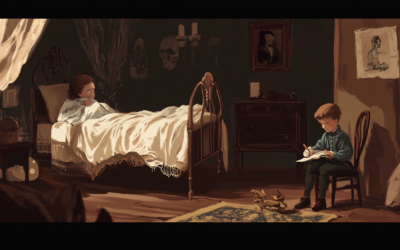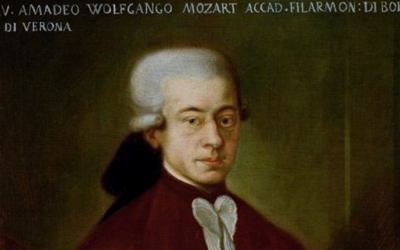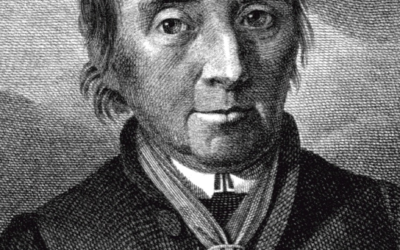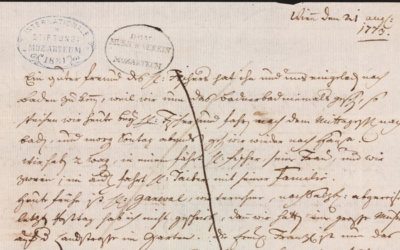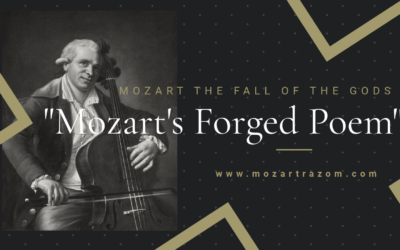Leopold Mozart’s Fabrications
Versailles, Vanity, and the Pursuit of Prestige
Leopold Mozart was not just a father and musician—he was a master of illusion, a relentless self-promoter who manipulated facts to create a legend. During the Mozart family’s three-year European tour, he carefully curated their image, exaggerating achievements, fabricating royal encounters, and ensuring that every letter he wrote contributed to the grand myth of his son’s divine genius. But how much of it was real? The supposed triumphs at Versailles, the fabricated intimacy with the French royal family, and the exaggerated praise in contemporary publications tell a different story—one of calculated deception, ambition, and a desperate attempt to elevate the family’s status.
The Myths Behind the Mozart Family’s European Tour
A Tour Designed for Fame, Not Music
Leopold obtained leave from his post as vice-Kapellmeister in Salzburg in 1763, embarking on an ambitious journey that lasted over three years. The destinations were not chosen for their musical significance alone but were meticulously selected to maximise prestige. Munich, Augsburg, Stuttgart, Mannheim, Frankfurt, Brussels, and Paris were not just centres of music but key locations where the family could court aristocratic favour.
The ultimate goal was Versailles, the most exclusive court in Europe. However, gaining access to the royal family was no simple task. Here, Leopold’s talents as a manipulator came into play. He enlisted the help of Baron Friedrich Melchior Grimm, editor of the Correspondance Littéraire, a periodical filled with gossip thinly disguised as literary and musical criticism. Grimm became the Mozarts’ gateway to the Parisian elite, arranging performances and writing glowing reports that exaggerated their success.
The Versailles Illusion
One of the most extravagant fabrications in Leopold’s letters concerns the Mozarts’ visit to the Palace of Versailles in early 1764. According to his account, Wolfgang and Nannerl met Princess Adelaïde, the eldest daughter of Louis XV, during a public procession. The princess allegedly stopped, allowed them to kiss her hand, and even embraced them repeatedly.
But Leopold’s most fantastical tale came from New Year’s Eve, when, according to his letters, the royal family invited Wolfgang to dine with them, seated beside Queen Maria Leszczyńska, who lovingly served him food like a devoted nurse. Even King Louis XV, Leopold claimed, was so captivated that he stood by timidly, waiting for his wife to translate Wolfgang’s words.
If Leopold’s account were true, it would have been an extraordinary breach of court protocol. Versailles was infamous for its rigid etiquette—one did not simply sit beside the queen, let alone receive food from her hand. The courtiers surrounding the monarchs would never have allowed a wandering musician, let alone a six-year-old boy, to break such strict conventions. It is telling that no independent accounts confirm Leopold’s descriptions.
A Life of Fabrication and Self-Promotion
Leopold was not just exaggerating—he was systematically constructing a legend. His letters to Salzburg, especially those to the Hagenauers, the family’s financial backers, were carefully tailored to each recipient. To Mrs Hagenauer, a deeply religious woman, he painted a moralistic picture of the sinful French, claiming that Parisians abandoned their children to neglect, even allowing them to be eaten by pigs. This grotesque imagery, conveniently placed alongside descriptions of the Mozarts’ supposed triumphs, served one purpose: reinforcing the family’s divine mission while contrasting their virtue with the decadence of the French aristocracy.
At the same time, when describing Wolfgang’s performances, Leopold’s tone shifted dramatically—every concert became a historic triumph, every noble house bent over backwards to host them, every aristocrat was in awe of the young prodigy. Even if real success had been moderate, his letters ensured that in Salzburg, the Mozarts were seen as conquering heroes.
What Did Wolfgang Actually Play?
The reality of these performances was far less glamorous than Leopold suggested. The posters advertising their concerts in Paris never mentioned specific composers—Nannerl was said to play “the most difficult Sonatas and Concertos of the greatest Masters,” but without identifying a single name. Wolfgang performed Minuets, Sonatas, Trios, and occasionally Symphonies, but there is no evidence that any of the works were his own. In all likelihood, Leopold assembled a repertoire of compositions by various authors, carefully curated to fit Wolfgang’s abilities.
MozartrazoM
“The rigid court etiquette, especially at Versailles, dictated that royal highnesses were practically unapproachable. Yet, according to Leopold, Wolfgang managed to break countless strict rules in a single evening."
Madame de Pompadour’s Indifference
While Versailles is often associated with Mozart’s supposed triumph, one recorded incident stands out: the performance before Madame de Pompadour, Louis XV’s powerful mistress. Unlike the fawning nobles in Leopold’s letters, Madame de Pompadour showed no interest in the young musicians. She barely acknowledged them, a rare instance where the historical record contradicts the Mozart myth. If the performances had been as miraculous as Leopold claimed, would the most influential woman in France have remained so indifferent?
The Silent Presence of Anna Maria Mozart
In all of Leopold’s grand storytelling, one figure remains in the shadows—Anna Maria Mozart, Wolfgang’s mother. She accompanied her husband and children on their exhausting tour across Europe but is barely mentioned in Leopold’s letters. If she appears at all, it is as an afterthought, a forgotten accessory to Leopold’s grand narrative. Her presence was essential, yet in the world constructed by Leopold, she was invisible.
A Carefully Constructed Myth
Leopold’s letters were never meant to be objective accounts. They were written with a future biography in mind, ensuring that Wolfgang’s legacy was built on spectacle and mythology rather than historical fact. He was not content with his son merely being talented—he needed him to be divine. But in his desperation to create this image, he resorted to embellishment, manipulation, and outright fiction.
“The rigid court etiquette, especially at Versailles, dictated that royal highnesses were practically unapproachable. Yet, according to Leopold, Wolfgang managed to break countless strict rules in a single evening.”
The Mozart family’s European tour was undoubtedly significant, but not for the reasons Leopold wanted the world to believe. It was not a journey of artistic conquest, but of careful marketing, relentless self-promotion, and an unyielding pursuit of social prestige.
For more revelations on the Mozart family’s hidden history, read Mozart in Italy—a groundbreaking investigation into the myths and realities behind one of history’s most manipulated musical figures.
📖 Mozart in Italy: Available now!
You May Also Like
#2 The Hidden Truth of Mozart’s Education
In this video, we uncover the hidden truth behind Wolfgang Amadeus Mozart’s early education and challenge the long-held belief in his effortless genius. While history often celebrates Mozart as a child prodigy, effortlessly composing music from a young age, the reality is far more complex.
The London Notebook
The London Notebook exposes the limitations of young Mozart’s compositional skills and questions the myth of his early genius. His simplistic pieces, fraught with errors, reveal a child still grappling with fundamental musical concepts.
The Mozart Question
In this revealing interview, we delve into the lesser-known aspects of Wolfgang Amadeus Mozart’s life, challenging the long-standing myth of his genius. A Swedish journalist explores how Mozart’s legacy has been shaped and manipulated over time, shedding light on the crucial role played by his father, Leopold, in crafting the career of the famed composer.
Georg Nissen and the Missing Notebooks
After Mozart's death, his widow, Constanze, found a steadfast partner in Georg Nikolaus von Nissen, a Danish diplomat who dedicated his life to preserving the composer's legacy. Nissen not only compiled an extensive biography of Mozart but also uncovered and...
Letters Under Surveillance
In a world without privacy, Leopold Mozart’s letters were carefully crafted not just to inform but to manipulate perceptions. His correspondence reveals a calculated effort to elevate his family’s status while avoiding any mention of failure or controversy.
#3 Leopold Mozart’s Literary Theft
Hidden within the Mozarteum’s archives lies a poem that has long been hailed as a tribute to the young Mozart children. But behind this innocent façade is a story of deception, literary theft, and one father’s ambition to rewrite history.



